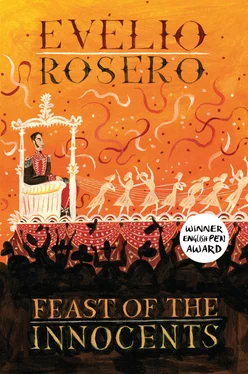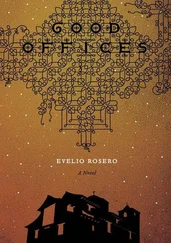“Lamentably,” Doctor Proceso wrote, “the statue of José Rafael Sañ-udo does not preside, as it should, over the portico of the Nariño Academy of History, which he founded: the statue of José Rafael Sañudo does not even exist.” But he added: “What do statues matter? The work endures.”
The only thing Doctor Proceso granted Sañudo’s detractors was that his style really was convoluted — amalgam of philosopher, mathematician and polyglot that he was — regrettably more suitable for consumption by other historians than by the general public. And for this very reason Doctor Proceso had proposed a volume that would describe, with crystal-clear clarity, not just the political, economic and military deeds of the so-called Liberator, but his other deeds of more human aspect, which would end up shedding light on the monumental historical mistake of conferring upon Bolívar a noble leading role in the independence of the Latin American peoples, a leading role which he did, of course, play, thought the doctor, but of the most atrocious kind.
This objective, however, this book he had spent half his life struggling to write, had turned out to be beyond his powers. Doctor Justo Pastor Proceso López, whose work (running his practice, the two or three women who were his occasional lovers as well as being his patients, the management of his finca in Sandoná, his considerable reading, various obligations at home or to do with his two daughters, and his genuine concerns about Primavera Pinzón, who did not cease to plague him with excessive expenses and assail him with other worse tribulations) took up the majority of his time, Doctor Justo Pastor Proceso López admitted to himself that he would never really perfect his Great Lie of Bolívar, that a Sañudo is born but once every hundred years, and that he himself was no writer, no historian, no musician, no poet by any stretch of the imagination.
But he held on to certain expectations concerning what he called “Human Investigations,” interviews he had obtained over the years, with people from all walks of life in Pasto and in various towns in Nariño province, about the so-called Liberator’s shameful passage across southern Colombia. Of those interviews, some on paper, some recorded, his hopes were centred on the ones he carried out, on tape, with two direct descendants of people who had suffered Bolívar’s rage: a woman, Polina Agrado, recently deceased in Pasto at ninety-three years of age, and Belencito Jojoa, still alive, an old man of eighty-six who lived in the Obrero neighbourhood with his third wife and numerous children and grandchildren.
Something which piqued the doctor’s curiosity, and troubled him, was that both testimonies had to do with the so-called Liberator’s lust rather than with any of the other passions — anger, cowardice, ambition, vanity — he had possessed in such abundance. But testimonies as truthful as these did not grow on trees, so he transcribed them just as he recorded them, even though they seemed like discordant voices in the work he had planned, a work which would wipe the dust and lies from the face of history — or historians, he said — and guide the youth of the day through the Latin American wars of independence under the banner of truth.
And now, eager as a child, in front of Maestro Tulio Abril’s shot-up float, “Don Furibundo Chasing his Wife,” Doctor Proceso threw himself into imagining, represented over three or four carnival floats — or on a single, huge one — each and every one of Bolívar’s most troubling exploits: troubling because they were false and because, even being so, they continued to circulate in schools and colleges as if flowing from the fountain of truth. With this float, he thought, Simón Bolívar would plainly and simply be exposed as a myth, an utter myth, each of his most infamous and obvious manoeuvrings woven together — Simón Bolívar, he said to himself, revealed at last, Simón Bolívar just as he was: his extraordinary capacity to convince his contemporaries and, in passing, generations to come (with letters and proclamations that were bombastic, scheming, raving and wily, pompous and pedantic, passionately wordy, pastiches of Alexander the Great and Napoleon) that he was someone he was not, that he had achieved things he had not, and that he should pass into history as the hero he was not.
Maestro Tulio Abril’s teeth were still chattering, not so much from the cold as from what he had just been through. Seated on a bench, he was drinking a cup of hot aguapanela ; Doctor Proceso was doing the same beside him, while Zulia Iscuandé handed out more aguapanela to the workers.
“Not a scratch,” the doctor said. “It seems the avenging Arcángel shot more at heaven than at you.”
“At heaven?” The maestro became angry. “He shot at me, I felt a bullet warm my ear.”
“Well, thanks be to Our Lady of Perpetual Help he only warmed your ear,” Zulia Iscuandé said. “Drunk as he was he could have shot us too, not just you, or shot himself, all with the same damned rotten nerve.”
“Check the float,” the maestro ordered. He trembled with anger and shock. “Check it over inch by inch to see what damage that devil did. Salvador, check the float.”
Salvador ran to the float, followed by the rest of the children.
“I’m never going to destroy it,” the maestro said, “even if they offer me paradise on earth.”
“You’re not going to destroy it,” Doctor Proceso responded, and added, after an expectant pause: “You’re going to convert it.”
They looked at him without understanding, without recognizing him. And it was because the doctor looked like someone else, very different from the man who first arrived (soaked through, in a bad mood and longing to leave); now he shivered, not with cold, but emotion, he was constantly raising his eyes to “Don Furibundo Chasing his Wife” and going off into raptures: had he gone mad? He was jabbering and whispering, blurting out exclamations and biting them back, like someone prey to the most profound illusions.
“And how do you want me to convert it?” the maestro asked. He asked out of politeness, because he was still grateful for the help he had received from the doctor ten years before, but his pride was hurt: he never liked anyone to come along and suggest changes to his floats. Had it not been the doctor he would have thrown him out of the workshop long ago: after all, he had arrived in the company of the drunken devil.
The doctor steadied his voice. Now or never, he thought. He was well aware they were waiting for his answer. He had to tread carefully.
“Maestro Abril,” he began, “we’ll make Arcángel de los Ríos pay what he promised, but three times over. We were witnesses here: attempted homicide, wasn’t it? Tomorrow, when he wakes up after his binge, the avenging Arcángel will be like putty in our hands. I’ll speak to him, I’ll tell him I will use my good offices so that none of the artisans file a suit against him, but I’ll warn him, on your behalf, that he’ll have to pay triple what he promised, I mean three times the prize money for the winning float.”
There was an eerie silence.
And a piercing whistle was heard from Iscuandé.
“Sounds good,” she said.
“Many a slip…” Martín Umbría said. He was the master craftsman who had been working with Tulio Abril the longest, and they listened to him respectfully. “The main thing is that the drunkard pays up and doesn’t come here again, plastered, and shooting every which way.”
“I’ll take care of it,” the doctor said. “I’ll tell him he won’t be on the float chasing his wife any more, but that he’ll have to pay triple not to end up accused.”
“There’s something that doesn’t convince me,” Maestro Abril said. “How come he’s not going to be on my float?”
Читать дальше












